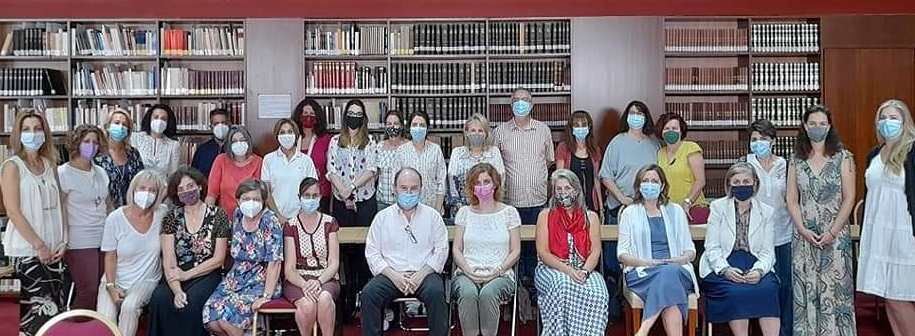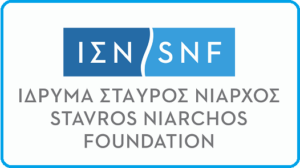Tagged: “Forgiveness Education”
Forgiveness Education in Greek Schools Expands with IFI – University Collaboration
More than 3,000 grade school students in Greece are learning how to reduce their anger, increase cooperation, gain resilience, and transform their traumas into personal character strengths through Forgiveness Education classes during this 2021-2022 school year.
“Trauma Transformation Through Forgiveness Education” is a social-emotional learning (SEL) program developed by Dr. Peli Galiti, Ph.D., M.Ed., research scholar at the University of Wisconsin – Madison. Dr. Galiti, a native of Athens, is also Director of the Greek Forgiveness Education Program (GFEP) started in 2014 by the Madison-based International Forgiveness Institute (IFI).
“This one-of-a-kind program is based on the educational research studies conducted by Dr. Robert Enright who pioneered the field of Forgiveness Education,” says Dr. Galiti. “His studies have demonstrated that Forgiveness Education classes help students reduce in anger and hostile attribution, increase in empathy, and actually result in improved grades.”
Dr. Enright is a UW-Madison educational psychology professor who co-founded the International Forgiveness Institute in 1994. He has developed comprehensive Forgiveness Education curricula for students in grades K-4 through 12th that are now being used in more than 30 countries around the world.
According to Dr. Galiti, the new program is actually a collaboration between the IFI, UW-Madison, and two Greek universities—the Aristotle University of Thessaloniki and the National and Kapodistrian University of Athens (where Dr. Galiti previously lectured). Funding is provided by the Athens-based Stavros Niarchos Foundation, one of the world’s leading private, international philanthropic organizations. The program also has the endorsement of the Greek Ministry of Education.
Dr. Galiti began implementation of the Trauma Transformation program last September by leading a series of Forgiveness Education workshops for 110 Greek teachers. Those teachers are delivering the forgiveness classes this semester at schools in four Greek cities–Athens, Larisa, Patra, and Thessaloniki.
That training focused on techniques and methods the teachers could use to help their students manage traumatic experiences and any personal or relational difficulties that might cause harm and pain. Thematic instructional units included:
- Forgiveness Education theory and principles.
- Why forgiveness is necessary and how it is applied in the school environment.
- Theories about trauma and its treatment.
- Transformation and wound healing through Forgiveness Education.
- Collaboration in the classroom and conflict resolution.
- The experience of Forgiveness Education in Greek schools: Best Practices and Case Studies.

These grade school teachers in Athens were among the 110 teachers who received Forgiveness Education training conducted by Dr. Peli Galiti as part of the collaborative effort between the University of Wisconsin-Madison and the University of Thessaloniki.
The collaborative training efforts for this Forgiveness Education program have received support and major funding through the Greek Diaspora Fellowship Program that is designed to help avert Greece’s brain drain and develop long-term, mutually beneficial collaborations between universities in Greece, the United States, Canada, South Africa and Australia. The Fellowship Program is managed by the Institute of International Education in collaboration with the Fulbright Foundation in Greece, and funded by the Stavros Niarchos Foundation.
In 2017, Dr. Galiti was one of 30 Greek- and Cypriot-born scholars representing 28 prominent United States and Canadian universities who traveled to Greece to conduct academic projects with their peers at Greek universities as part of the Greek Diaspora Fellowship Program. As part of her fellowship, Dr. Galiti hosted workshops about Restorative Justice and Forgiveness Education, along with conducting research about bullying prevention and class collaboration.
- Visit the Greek Forgiveness Education Program website.
- Watch a 4 min. 12 sec. video about the Greek program: Learning to Forgive.
- Read more about Dr. Galiti’s eductional work in Greece.
- Watch a video webinar on Greek Forgiveness Education featuring presentations by Dr. Galiti and Dr. Enright.
About the Stavros Niarchos Foundation:
The Stavros Niarchos Foundation (SNF) (www.SNF.org), is one of the world’s leading private, international philanthropic organizations, making grants in the areas of arts and culture, education, health and sports, and social welfare. Since 1996, SNF has committed more than $3.3 billion through 5,100 grants to nonprofit organizations in 135 countries around the world.
The Foundation funds organizations and projects that are expected to achieve a broad, lasting and positive impact for society at large, and exhibit  strong leadership and sound management. The Foundation also supports projects that facilitate the formation of public-private partnerships as an effective means for serving public welfare. In addition to its standard grants, the SNF has continued to respond to the urgent needs of Greek society, by providing relief against the severe effects of the socioeconomic crisis through three major grant initiatives of $378 million.
strong leadership and sound management. The Foundation also supports projects that facilitate the formation of public-private partnerships as an effective means for serving public welfare. In addition to its standard grants, the SNF has continued to respond to the urgent needs of Greek society, by providing relief against the severe effects of the socioeconomic crisis through three major grant initiatives of $378 million.
A Promise Kept
Have you ever made a promise to love, honor, and obey outside the covenant of marriage? In a certain way, I have.
That promise, which I made in 2002, has now been fulfilled as we turn the clock to 2022. We at the International Forgiveness Institute had just decided to start forgiveness education programs at the century’s turn. The point was this: If learning to forgive can aid people’s recovery from deep injustices against them, then wouldn’t it be a good idea to help young children learn to forgive so that, once the storms of life hit them as adults, then they would have a tool, forgiveness, to avert confusion, resentment, and even possible abiding anger and anxiety? It seemed to be worth a try and so we looked around the globe with this question: Where is there a society that now is post-conflict, which has suffered, and which might benefit from forgiveness education?
Our team at the International Forgiveness Institute, after much thought and discussion, centered on Belfast, Northern Ireland for four reasons: 1) There had been The Troubles across Northern Ireland, in which Irish Catholics and British Protestants were in an escalated conflict since 1972’s Bloody Sunday in Derry/Londonderry; 2) there was a signed peace accord in 1998, which reduced the conflict, but still there was a post-conflict sense of tension; 3) the two groups were English-speaking and so we would not have to start with interpreters; and 4) Ireland and Northern Ireland are two of the closest ports-of-call from the Eastern United States.
So, off my two sons and I went in July of 2002, landing first on the West Coast of the Emerald Isle and then to Belfast, where we met the esteemed Anne Gallagher, who formed Seeds of Hope to do her best to bring peace to Northern Ireland. Anne was amazing in introducing us to primary school personnel and we had the great honor to start forgiveness education in both St. Vincent de Paul Primary School and Ligoniel Primary School, both on the Ligoniel Road in Belfast.
“Forgiveness isn’t something that’s talked about with reconciliation, but it’s needed to bring closure to the pain and suffering experienced in Northern Ireland. You can’t contemplate hope unless you address despair. To heal the wounds of Northern Ireland I believe you have to see humanity in the face of the enemy. Forgiveness is a journey.”
Anne Gallagher (1953-2013)
Upon my first visit to the principal of St. Vincent de Paul School, Mr. Brian McParland, he heard our proposal for forgiveness education and agreed that this is a vital vision for Northern Ireland. He assented to having this programme pioneered in his school. Yet, he quickly added this: “You will not last more than 3 years here in Belfast.” I was surprised to hear that and asked, “Brian, why do you say that?” He looked at me and said, “No one lasts more than 3 years in Belfast. After that time, people grow weary, the thrill of travel wears off and they quit.” I took a deep breath and answered, “Brian, I will give you 20 years.” He looked at me with kindness, but said nothing.
Well, as I consult Siri on the Apple Watch, I see that the calendar is about to turn to the year 2022. Hold on for a minute. . . I have to do a little bit of quick math. Ahh, yes. . . it has been exactly 20 years now since my promise to Mr. McParland. Our International Forgiveness Institute has successfully implemented forgiveness education now in many schools of Belfast and surrounding communities.
As we end the 20th year, some of us at the University of Wisconsin-Madison are doing a research program with 18 classrooms of primary 7 students (grade 5 in the United States), across Northern Ireland, funded by the John Templeton Foundation. This will culminate in an international conference in Madison, Wisconsin, led by Jacqueline Song of our International Forgiveness Institute,  in which these teachers will participate.
in which these teachers will participate.
As I look around, I see that Mr. Brian McParland now is retired from his educational duties. Mrs. Claire Hilman, the principal at Ligoniel Primary in 2002, also is retired. Dear Anne Gallagher now has passed to eternal life. No other educators who joined us two decades ago are still there. As I look around, I see that I have kept my promise now only to God and me. And that is sufficient for the promise-keeping. I hope that at least some in Northern Ireland are the better for it.
A promise kept may bear fruit of which none of us is aware and this is why we press on with the vision for forgiveness education, started two decades ago.
Robert
Grieving Sandy Hook Mother Finds Peace in Forgiveness
The tragedy that broke the heart of a nation has led one mother from her journey of suffering for the loss of her child to what many consider unthinkable — forgiveness of the one who had taken so much from her.
Jennifer Hubbard’s 6-year-old daughter, Catherine, was one of the 20 students and 6 teachers who were shot and killed at Sandy Hook Elementary School in Newtown, Connecticut, nine years ago this month (Dec. 14, 2012). In one of the deadliest school shootings in U.S. history, the 20-year-old shooter ended his rampage by killing himself outside one of the classrooms.
The unimaginable horror of the tragedy and the raw emotion of losing her red-haired kindergartener caused virtually everything in Hubbard’s life to crumble around her.
Like parents of the other 19 students who never returned home from Sandy Hook, Hubbard found it difficult to consider recovery and healing. Still, she had to move forward to nurture Catherine’s second-grade brother, Freddy, who was also grieving, and to fulfill her pledge to make something positive out of the tragedy.
“On a purely human level, it is impossible to imagine being able to heal from the devastation of kneeling on the frozen earth beside your baby’s grave,” according to Hubbard. Relying on her Catholic faith and an outpouring of donations from supporters across the country, Hubbard slowly was able to grapple with her unthinkable pain and eventually to consider forgiveness.
“Surrendering debts takes time and does not mean forgetting,” she recently explained. “Forgetting would return us to where we started. … Forgiveness releases another from the debt you feel owed and gives your heart permission to heal rather than keep score and has more to do with us than them.”
Before Catherine died, Hubbard says, she could not understand people forgiving those who had inflicted unthinkable pain upon them. But now, by practicing forgiveness herself, she says she is able to experience peace and personal tranquility.
“Forgiveness is where we are changed, both in forgiving those who have launched assaults and in forgiving ourselves,” Hubbard writes in her recently published book Finding Sanctuary: How the Wild Work of Peace Restored the Heart of a Sandy Hook Mother. Each chapter in the book is dedicated to one step in Hubbard’s journey toward “wholeness” along with reflection questions and action steps for application in the reader’s own life.
Through her story, Hubbard shows readers how they can embrace grief and vulnerability to help heal their heart. As Fr. Peter John Cameron, O.P., writes in the book’s Forward: “Jennifer Hubbard’s achingly beautiful book takes us to the heart of horror and leads us out to an otherwise unimaginable hope.”
Catherine’s memory is kept alive in Newtown by donations from across that country that led to the creation of the Catherine Violet Hubbard Animal Sanctuary that provides learning opportunities related to all the things Catherine loved—bugs, birds, pets, farm animals and nature. Hubbard also does that through speaking, including radio interviews and appearances on national television news shows.
How can we keep forgiveness initiatives going in schools and social groups, such as correctional institutions?
I just do not have the confidence to forgive one of my parents from issues of long ago. I keep telling myself that I will not be able to get it done. What can you suggest to me that might boost my confidence?
First, I suggest that you look back on your life to concrete examples of your forgiving others. Have you had at least one successful attempt in your past? If so, you have shown yourself that you can forgive.
Even if you have never forgiven someone, you can start now with someone who is easier to forgive than your father. Try to recall someone who has hurt you in the past, but who has not hurt you severely. Start the forgiveness process with him or her and keep at it until you have forgiven. Once you succeed with this person, then try another, again who has not hurt you gravely.
Once you have successfully practiced forgiveness on these two people, keep in mind the path that you walked and now apply it to your parent. The practice may give you the confidence you need.




